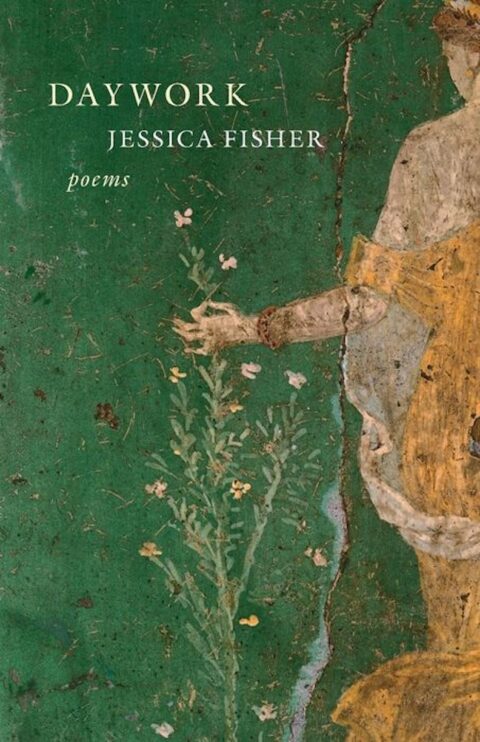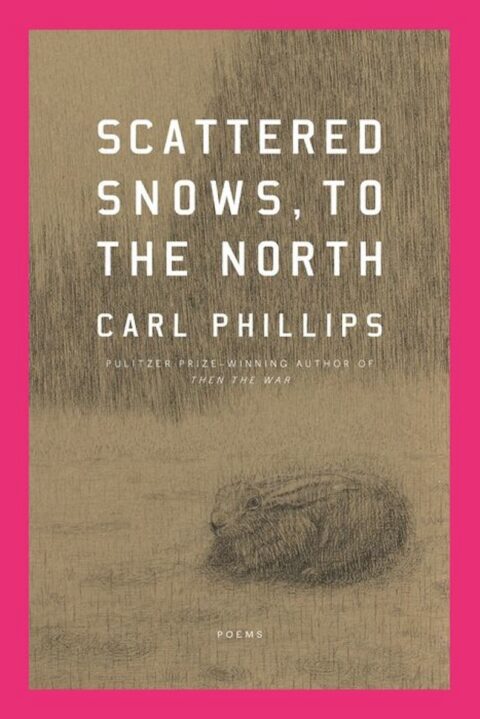With poets I love — and I have ardently followed the poems of Jessica Fisher and Carl Phillips since the publication of their first books — I allow my first and second read-throughs of a fresh, often long-awaited collection to wash over and seep into me, the way I might listen to beloved, soul-plumbing music, Beethoven’s Piano Sonata No. 5, for example, or Coltrane’s “Equinox.” But perhaps because I myself write poems, I find myself on subsequent reads also marveling at the techniques, the “ruses,” by which these writers make their magic. I also search for inklings for the reasons I not only admire the poems and learn from them, but also for the ways, the reasons, they help me to live.
Even before I found references to him in the most recent collections of Jessica Fisher and Carl Phillips, I found myself, while savoring this new work, thinking of another favorite poet, Thomas Wyatt. Why?
Several reasons come to mind, not the least of which is what W. S. Merwin, in his Introduction to The Essential Wyatt (Ecco, 1989), calls the “singular plangency” of Wyatt’s poems — their undertone of petition, emotion, and yearning. In unique ways and for various reasons, the poems of Fisher and Phillips resound with a similar pensivity and stylistic originality. But what I found myself noting in these new collections, too, is their Wyatt-like mixture of vernacular, unadorned speech and virtuosic turns of formal sentience. Merwin writes, “I think there is in … Wyatt’s great songs … the exquisite delicacy of the late medieval lyric to articulate a harshness and irony of subject and feeling that can be startlingly at odds with the form, and the result is the creation of a peculiar tension and power … [a] mixture of bluntness and grace, directness and song.” I find this tension and power in these new collections.
*
Jessica Fisher’s first book of poems, Frail-Craft, was selected by Louise Glück for the 2006 Yale Younger Poets Prize. Her sophomore book, Inmost, appeared with Nightboat in 2012. In a review of Inmost for the Los Angeles Review of Books, an essay that considered second books by Fisher and poet Louise Bogan, I wrote:
“In the Introduction to Jessica Fisher’s first book, Frail-Craft, winner of the Yale Younger Poets Series in 2006, contest judge Louise Glück writes: “For all the music, the sensuous detail of Fisher’s art, her demeanor is essentially cool, measuring, intellectual — speculative may be a more accurate term. When such composure takes on, as it does in a number of shorter poems, explicitly passionate or erotic subjects, what results are poems so pure, so violent, so absolute, they seem like choral laments in a Greek tragedy.’ Glück could, of course, be describing a Louise Bogan lyric here — or, for that matter, a Glück poem. Among the many affinities these poets share is a specular, luminous interiority and an intuition for the ways in which the rhythmic instresses of the closely observed make thinking visible. Both Fisher and Bogan are obsessives who trust words (rhymes, etymologies) to reveal what might otherwise remain repressed. There is a baroque saturation to the plain speech of each.”
 In the Acknowledgments pages of Daywork, Fisher says that the book was conceived during a year her family spent in Rome as a 2012 awardee of the Joseph Brodsky Rome Prize, and quite naturally many of the poems in Daywork occur in or recall the speaker’s time spent in the Eternal City, the City of Seven Hills—on its roads and byways, in its museums and archives. Gestating in the period from that year and over the decade-plus interlude between the publication of Inmost and Daywork, parallels to the violences of the fall of Rome (“the state unthinkable, the state of affairs,” she writes in “Thrall”) are evident, present and prescient everywhere in this third volume: imperilments posed by climate, mass killings, domestic violence, war, politics, and pandemic, as well as personal experiences of grief and loss (there are moving elegies here for Seamus Heaney and, in particular, the poet Hillary Gravendyk). The adage ars longa, vita brevis beats at the heart of this collection; with precise, attentive care the speaker explores what paying close attention in our daily lives can teach us about how to live in a time of increasing threat. Life is short but art (paintings, poems) lives long. We were here for a meeting, to paraphrase Fisher in “Roundabout,” “Whose bandage was time.” How make the most of that brief interlude of living?
In the Acknowledgments pages of Daywork, Fisher says that the book was conceived during a year her family spent in Rome as a 2012 awardee of the Joseph Brodsky Rome Prize, and quite naturally many of the poems in Daywork occur in or recall the speaker’s time spent in the Eternal City, the City of Seven Hills—on its roads and byways, in its museums and archives. Gestating in the period from that year and over the decade-plus interlude between the publication of Inmost and Daywork, parallels to the violences of the fall of Rome (“the state unthinkable, the state of affairs,” she writes in “Thrall”) are evident, present and prescient everywhere in this third volume: imperilments posed by climate, mass killings, domestic violence, war, politics, and pandemic, as well as personal experiences of grief and loss (there are moving elegies here for Seamus Heaney and, in particular, the poet Hillary Gravendyk). The adage ars longa, vita brevis beats at the heart of this collection; with precise, attentive care the speaker explores what paying close attention in our daily lives can teach us about how to live in a time of increasing threat. Life is short but art (paintings, poems) lives long. We were here for a meeting, to paraphrase Fisher in “Roundabout,” “Whose bandage was time.” How make the most of that brief interlude of living?
 In particular, the notion of the giornata, which refers to the section of wet plaster in fresco painting that can be painted in a single day, an achievement marked by a visible seam in the plasterwork, provides a way. “I wanted to trace that limit,” Fisher writes in the title poem, “to know / where the painter had found an edge / and stopped, the scaffolding descended / and the brushes washed, the figure left to dry.” Fisher explores this praxis of stopping and starting, of edges, of the importance of limits, in other poems. “Where work ends the work begins,” she writes in “After Empire.” In the prose poem “Origin,” Fisher notes, “The squirrel in the winter pines traces the shape of a V, down one branch, up the next, from tree to tree, never meeting the ground. The poet too must move that way, from thing to thing, where the branches cross.” In the series “Dear Friend,” one side of a written conversation between the poet and scholar Margaret Ronda, Fisher writes (in an epistle dated “March 6, 2020,” at the start of the pandemic):
In particular, the notion of the giornata, which refers to the section of wet plaster in fresco painting that can be painted in a single day, an achievement marked by a visible seam in the plasterwork, provides a way. “I wanted to trace that limit,” Fisher writes in the title poem, “to know / where the painter had found an edge / and stopped, the scaffolding descended / and the brushes washed, the figure left to dry.” Fisher explores this praxis of stopping and starting, of edges, of the importance of limits, in other poems. “Where work ends the work begins,” she writes in “After Empire.” In the prose poem “Origin,” Fisher notes, “The squirrel in the winter pines traces the shape of a V, down one branch, up the next, from tree to tree, never meeting the ground. The poet too must move that way, from thing to thing, where the branches cross.” In the series “Dear Friend,” one side of a written conversation between the poet and scholar Margaret Ronda, Fisher writes (in an epistle dated “March 6, 2020,” at the start of the pandemic):
“It already seems a long time ago since we stood in the rubble where the fill juts into the bay. Someday in the future I will think back to us then, how we saw where the sea touched earth; salt, sand. A way of framing things — I know that. Ever since the first class in college, where we cut a rectangular hole out of a sheet of cardboard, and she said, to be an artist is to select. She said to impose the frame on what we saw, so that it might become art, which means that what I was taught is that art excludes. I miss you ….”
These are, as I wrote about Inmost, plain-spoken, forthright poems imbued with a deftly dealt out intricacy of thought. “[There is] [o]nly so much description can do,” Fisher writes in “After Empire.” Instead, these poems explore with patient attention what the poem, what art, can and cannot do. Here is the poem “Hive”:
In their darkened cells, locked in
with wax, the larval bodies hardening.
Are they scared in there, the children
want to know, does it hurt to change?
In the dark room, in the sealed cell.
How am I to know? When I think of their hive
I think of her lungs, honeycombed by illness.
That was the word she used for it, long ago.
Since in a net I seek to hold the wind,
Wyatt wrote, meaning he could not.
“Every death takes a body,” Fisher writes in another elegy, “Speedwell.” So why not, she goes on,
lie in the grass in the sun, taking
the flowers as proof that nothing dies.
This is what the poem’s after,
after all: a figure, no matter how thin,
that might make these reversals
in matter seem like a switch flipped on
and off, off and on. A child playing
day and night, dark and light.
A single life like that, or not at all.
If in the bag the phone rings
and goes unanswered: will she
feel like that, calling from far away.
It’s hard to miss the double meaning of “lie” here. Is art a lie, any more than other human invention, say, like time? Thomas Wyatt could no more keep his lover than Fisher could keep her friend alive. Yet in art’s “lies,” in poetry’s lines, in the sun-warmed blades of grass and speedwell, the wages of love and faith abide.
*
Carl Phillips is the author of nearly 20 books of poems as well as several books of prose and translation. Phillips’ many awards include a Pulitzer Prize for Then the War: And Selected Poems, 2007-2020. But he is also a humble and a generous poet whose work I have been reading and writing about for decades. In December 2019, for example, I reviewed two of Phillips’s books for my “Second Acts” column at the Los Angeles Review of Books: his second book, Cortège (1995), and his then most recent, Reconnaissance. This gave me the chance to examine the evolution of one of the truly great and original poetry stylists of our time:
“In Phillips’s collection of essays The Art of Daring: Risk, Restlessness, Imagination (Graywolf, 2014), he proposes that restlessness — “of imagination, but also bodily, by which I have mostly meant sexual, I see that now — is what brings us to that space where art and life not only seeminterchangeable, but for a moment they are so, space where they can penetrate one another, space in which, caught between the two, we can be variously lost, broken, or we can summon that daring that can bring us — loss and brokenness in tow — to unknowing.” What Phillips articulates here about a restive, almost apophatic poetics, in which emptying ourselves of knowing makes room for new gnosis, might also be a way of beginning to describe the “how” (the design, the style) of his own poems, both early and late. Whether in the more stately, strophic lyrics in Cortège (a cortège, after all, even a Dionysian one, involves a “solemn or funereal procession”) or the by turns more undulant and more prose-like shapes of the poems in Reconnaissance(“reconnaissance” deriving from the French reconnaître to “recognize,” with military connotations involving surveillance), the Phillipsian “magic” involves a movement, a slippage of “powers,” of agency, and rhetorical mode — a simultaneous flourish of artifice and stripping away of any baroque gesture or foliage to create a nakedness, a clearing that in Phillips often takes the form of a field or vista, a wake as of aftermath—what in The Art of Daring Phillips intimates is an arrival at “unknowing”: not so much “ignorance … as a kind of removal of all the trappings of presentation — how we present ourselves to the world—and an accompanying exposure of the usually hidden parts, what we hide equally from others and from ourselves.”
 Scattered Snows, To the North continues to explore many of Phillips’s life-long obsessions —pursuit, surrender, patience, ardor, restraint, beauty, loss, and suffering. Ever eschewing “baroque gestures,” these spare poems are nonetheless gorgeously bodied forth in their delvings into belief, regret, and the poetic praxis of “rambling,” all again more sumptuous for their colloquial restraint and philosophical torque. These new poems are also subtly suffused with a sepia, autumnal acceptance that almost feels like hard-won contentment: “This is the deep light you’ve waited for,” Phillips writes in “This is the Light,” “unfiltered except / now and then by the memory of your first time seeing it … Now you live here, where it’s likeliest you’ll die, too, / you’re finally old enough, not just to say, but—without / sorrow or fear, most of the time — to understand the truth of it.” Phillips is done, he writes, with merely signaling the “renegade glamour of late fall, owlish, fox-ish,” and is instead dwelling within its lessons, surrendering to something like happiness, “as close to perfect as perfect gets here.”
Scattered Snows, To the North continues to explore many of Phillips’s life-long obsessions —pursuit, surrender, patience, ardor, restraint, beauty, loss, and suffering. Ever eschewing “baroque gestures,” these spare poems are nonetheless gorgeously bodied forth in their delvings into belief, regret, and the poetic praxis of “rambling,” all again more sumptuous for their colloquial restraint and philosophical torque. These new poems are also subtly suffused with a sepia, autumnal acceptance that almost feels like hard-won contentment: “This is the deep light you’ve waited for,” Phillips writes in “This is the Light,” “unfiltered except / now and then by the memory of your first time seeing it … Now you live here, where it’s likeliest you’ll die, too, / you’re finally old enough, not just to say, but—without / sorrow or fear, most of the time — to understand the truth of it.” Phillips is done, he writes, with merely signaling the “renegade glamour of late fall, owlish, fox-ish,” and is instead dwelling within its lessons, surrendering to something like happiness, “as close to perfect as perfect gets here.”
In this collection, we encounter a poet perhaps less sexually restless, but his already nimble and questioning mind is made more so by this middle-age dilation — “Desire had become by then something different / from what it had been,” he says in “The Closing Hour.” “More hurricane than tornado, its / damage there more easily at least prepared against, / if not forestalled.” The speaker has entered a period of acceptance, a later-in-life and in-love “regime” of tempered belief (one thinks of Charles Wright’s god-fearing agnosticism: “I believe in belief” — or as Phillips puts it in “Fall Colors,” “Believing in, versus believing”). Here is “Regime,” which opens the book:
As I took off
my clothes, I
watched him taking
his own off. The sound
of rain was for
once not the sound
of wind shaking
the rain steadily loose
from a stand
of river birch. It’s hard
to believe in them,
the beautiful colors
of extinction; but
these are the colors.
This small but powerful sonnet is signature Phillips, its movements not unlike those of an incipient hurricane, a recursive series of nuanced voltas gradually gathering force. There are no ten-dollar words here; the dazzlement comes, at least in part, from Phillips’s subtle turns —from lovers undressing to the sound of rain which is not the sound of wind shaking rain steadily loose “from a stand of river birch.” What, then is this sound, triggered by erotic prelude? Phillips doesn’t intend to tell us, but we feel the power of an answer when the poem then makes another turn, this time from a negation (“was for / once not”) (emphasis mine) to a statement about colors, and not just color but “the beautiful colors / of extinction,” of autumn, the coming dark, winter, forces of the natural world as we know it and of which we are a part in, eventually, ending. And Phillips gives us this knowledge in a big picture (the planet is imperiled) and in an intimate picture (we are in the autumn of our lives, we will die, let’s make love anyway) way.
 This sense of recursivity, in which beauty, belief, eschewal of regret, acceptance, and death turn into one another and are, again, re-embodied at every turn, is played out not only in the poems themselves, with their swerves and turns of thought (syntax, pronominal slippage, rhetorical modes and tones) but also by their ability to move in a single poem from more stately musings like “How close abundance is to excess,” to humor, “The leaves fell as if to a song called / ‘Come When I Tell You To,’ the water / received the leaves like a slightly different song: ‘Until Spoken To, Shut Up, No One’s Asking. Did I Ask You / a Question?’ Songs like that”). We see this movement in the poems’ formal shapes (many with crenelated, fortress-like left margins, others undulating down the page), and, strikingly, in the structure of the book itself, in which the title of section one (Somewhere It’s Still Summer) is the title of the last poem in part two; the title of part two (Rehearsal) is the title of the last poem in part three — and the last poem in the collection); and the title of the last section (When We Get There) is the title of the last poem in part one. All of this iterative motion creates a sense of what Phillips calls “rambling”: “Twice a day, instead of walking, I take my dog for what I call a ramble, where each corner we turn feels like a turning, as well, of imagination” (from “Fall Colors”). In “Troubadours,” he begins with a statement that could be an expression of this book’s poetics: “Life itself being a ramble of mystery, pattern, accident / and surprise, we took heart in knowing whatever road we were on / must be the right one.”
This sense of recursivity, in which beauty, belief, eschewal of regret, acceptance, and death turn into one another and are, again, re-embodied at every turn, is played out not only in the poems themselves, with their swerves and turns of thought (syntax, pronominal slippage, rhetorical modes and tones) but also by their ability to move in a single poem from more stately musings like “How close abundance is to excess,” to humor, “The leaves fell as if to a song called / ‘Come When I Tell You To,’ the water / received the leaves like a slightly different song: ‘Until Spoken To, Shut Up, No One’s Asking. Did I Ask You / a Question?’ Songs like that”). We see this movement in the poems’ formal shapes (many with crenelated, fortress-like left margins, others undulating down the page), and, strikingly, in the structure of the book itself, in which the title of section one (Somewhere It’s Still Summer) is the title of the last poem in part two; the title of part two (Rehearsal) is the title of the last poem in part three — and the last poem in the collection); and the title of the last section (When We Get There) is the title of the last poem in part one. All of this iterative motion creates a sense of what Phillips calls “rambling”: “Twice a day, instead of walking, I take my dog for what I call a ramble, where each corner we turn feels like a turning, as well, of imagination” (from “Fall Colors”). In “Troubadours,” he begins with a statement that could be an expression of this book’s poetics: “Life itself being a ramble of mystery, pattern, accident / and surprise, we took heart in knowing whatever road we were on / must be the right one.”
This new book is suffused with a mind that favors “instead of the sky’s edgeless / statement about vastness, the sea’s mixed set of questions whose / only answers, finally, are the questions themselves.” His poems find “shape first, then meaning, the way smoke does” (“Searchlights”). This is not to suggest, however, that the book isn’t highly crafted. It is precisely through this keen use of form that, in “Rehearsal,” the book’s last poem, Phillips can, with characteristic and agile sleight of hand, say what lies at this book’s heart’s deep core while also not saying it. The poem recounts, on one level, a trip through woods to a shore where two companions undress and swim out to a dark ship. This is, of course, also a poem about arriving at a certain point in one’s life. The poem is in two stanzas, and at the break from the first to the second, just as the pair are about to emerge from the forest and onto the shore, Phillips writes, “Maybe meeting you has been / the one good reason I lasted so long in a world that must / eventually not include me, I almost said to him.” Almost said. But also said.
*
A complex mixture of “bluntness and grace, directness and song” to which Merwin attributes the unique tension and power of Wyatt’s verse attracts me devotedly to the work of Jessica Fisher and Carl Phillips, as well. Phillips’s own shout-out to Wyatt (Wyatt’s famous sonnet “Who so list to hount, I knowe where is an hynde”) comes in a poem called “If Grief is Mostly Private and Always Various.” What Phillips says here about our existential grief (how can we live, knowing that the world is full of senseless loss, knowing we ourselves must die?) is imbued with a mix of forthrightness and beauty that characterizes the poems of both Phillips and Fisher, an honest gift of perception, imagination, and generosity for which I am grateful.
As for the sea, where’s that sound now, that the snow made
in black and white, falling into it, the snow like words
from a severed head held aloft, upside down, and shaken —
Nothing can ever / will ever / be the same.
Even if still reckless: wildering;
wild. Though I seem tame.
[Daywork by Jessica Fisher. Published by Milkweed Editions on March 19, 2024, 83 pages, $16.00 paperback … Scattered Snows, to the North by Carl Phillips. Public by Farrar, Straus & Giroux on August 6, 2024, 80 pages, $26.00 hardcover]